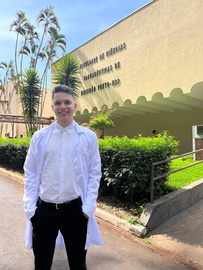Laboratório de Sinalização Celular na Resposta Inflamatória
In our lab, we use a multidisciplinary approach to understand how signaling transduction cascades initiate, progress, and ultimately regulate the function of innate immune cells upon activation of a primary function such as phagocytosis. This knowledge is used to gain insight into the pathogenesis of inflammatory disorders (such as autoimmune diseases and cancer), and in the mechanisms driving the balance between resistance and tolerance to infections. We currently aim to use cellular and molecular biology, protein biochemistry and immunoassays to investigate the role of the autophagy machinery, a bonafide mechanism of coping with metabolic stresses, in the regulation of phagocytosis by innate immune cells. Phagocytosis of invading microorganisms and dead cells is a primordial function of the immune system, and the phagosome has emerged as an autonomous signaling compartment within the cells. During phagocytosis, diverse components of the autophagy machinery can be recruited to the phagosome membrane, ultimately impacting cell function. In this context, our main current research projects include:
1. To determine the mechanisms of LC3-associated phagocytosis (LAP) induction and
LAPosome maturation.
2. To investigate the molecular mechanisms for the regulation of macrophage function
by LAP.
3. To investigate the consequences of LAP activation in innate immune cells in pathogenic contexts such as infectious diseases, inflammatory diseases and cancer





